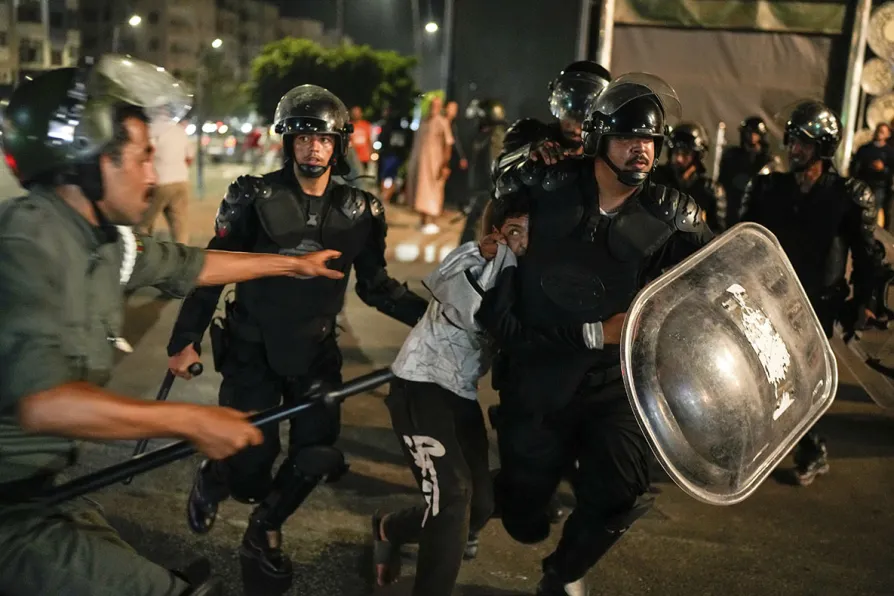
 A boy is detained as youth led protests calling for healthcare and education reforms turned violent, in Sale, Morocco, October 1, 2025
A boy is detained as youth led protests calling for healthcare and education reforms turned violent, in Sale, Morocco, October 1, 2025
THOUSANDS hit the streets of Morocco for a fifth straight night on Wednesday, as protests over the state of public services descended into deadly violence.
Police opened fire at the protesters in a southern town, killing two people.
The deaths in Leqliaa, about 312 miles south of the capital of Rabat, were the first fatalities as anger mounts across this North African country over conditions and government spending.
Morocco’s MAP news agency cited local authorities as saying the two “troublemakers” had been killed by police acting in self-defence.
It said those shot were attempting to seize police weapons, though no eyewitnesses could corroborate the report.
The demonstrations, organised by a leaderless movement dominated by internet-savvy youth, have taken the country by surprise and emerged as some of Morocco’s biggest in years.
By midweek, they appeared to be spreading to new locations despite a lack of permits from authorities.
Those taking part in the so-called “Gen Z protests” slam what they see as widespread corruption. They have contrasted the flow of billions in investment toward preparation for the 2030 World Cup, while many schools and hospitals lack funds and remain in a dire state.
But violence broke out in several cities on Wednesday evening, following days of mass arrests in more than a dozen cities, particularly in places where jobs are scarce and social services lacking.
In Sale, the poorer city just across the river from Morocco’s capital, eyewitnesses reported seeing hundreds of masked youth, mostly teenagers, torching cars, banks and shops, smashing windows and looting, with no police in sight.
The chaos came despite warnings from authorities, political parties in government and the opposition and the organisers themselves.
In a statement published on Discord, the Gen Z 212 protest movement earlier on Wednesday implored protesters to remain peaceful and blasted “repressive security approaches.”
“The right to health, education and a dignified life is not an empty slogan but a serious demand,” the organisers said.
Still, the protests have escalated and become more destructive on Tuesday and Wednesday, particularly in cities far from where development efforts have been concentrated in Morocco.
In its first public statement since the start of the protests on Saturday, Morocco’s Interior Ministry said the anonymously organised demonstrations lacked authorisation and were dealt with according to the law, noting that those found to be breaking it would be treated “rigorously and firmly.”
It said that 409 protesters had been taken into police custody.










